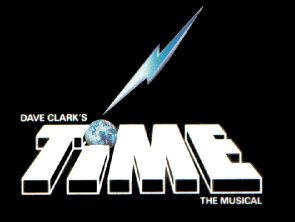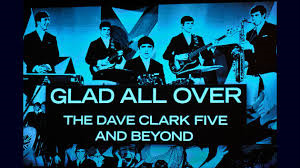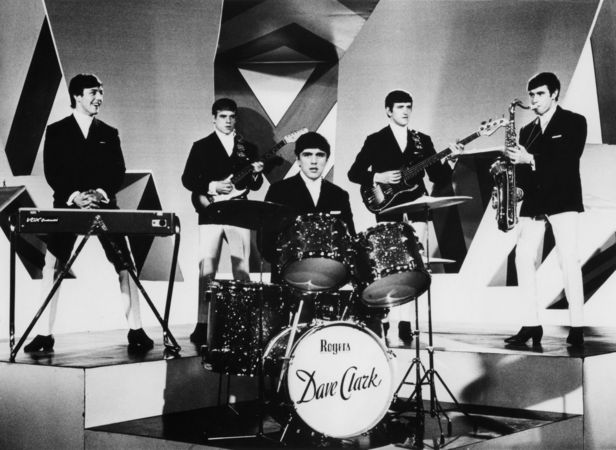THE DAVE CLARK FIVE
Playing Music For The Fun Of It
I was very lucky to see the great Mike Smith perform shortly before the tragic fall that paralyzed him and led to his death in 2008—just before the Dave Clark Five, finally, were inducted into the Rock and Roll Hall of Fame.
I got lucky again the day before PBS debuted the DC5 documentary The Dave Clark Five and Beyond—Glad All Over, when I spoke with Clark, then was in the audience at a screening that he attended and spoke at afterward.
The first thing that struck me was how soft-spoken and sincere he sounds when speaking. Of course, he was not the lead singer, but he had such propulsive drive as a drummer that Elton John, in the documentary, cites the “raw power” of the DC5 records, while Steven Van Zandt called them “the most powerful records ever made.”
“We were really a live performing band,” Clark said following the screening, speaking of himself, Smith, guitarist Lenny Davidson and the late saxophonist Denis Payton and bass guitarist Rick Huxley.
“At the Royal Tottenham [the premiere North London dancehall and the DC5’s home base—hence the term Tottenham Sound], we played for three-and-a-half hours to 6,000 people a night—and never repeated a song. Once we made it, we were restricted, and had to do the hits.”
Clark actually wanted to disband the group in 1967.
“I wanted to go out still feeling great,” he said. But he kept it going until 1970.
“We were still getting hits in Europe, but not in America,” he said. “The Europe hits weren’t made for the U.S. [market].”
But in the band’s U.S. heyday, as is noted in the documentary, the band had released 15 consecutive Top 20 U.S. hit singles within a two-year period—more than any other group except the Beatles—and appeared a record-breaking 18 times on The Ed Sullivan Show.
“We recorded a lot of songs for the U.S. market,” said Clark. “We took your music and made it our own—but it was your music.”
In the film and in my conversation with him, he noted how he and the band learned American hits like The Contours’ “Do You Love Me,” Bobby Day’s “Over and Over,” Chris Kenner’s “I Like It Like That” and Chuck Berry’s “Reelin’ and Rockin’” from playing American military bases in England early in their career. All these songs were later U.S. hits again when covered by the DC5.
“[Cheap Trick drummer] Bun E. Carlos said, ‘You introduced me to Chuck Berry,’” Clark recalled.
This rings true for me, too. Eleven years old then, I might have known these songs from the originals, but I definitely knew them from the DC5, same as I knew so many others from The Beatles and the Rolling Stones covers. Indeed, Elton, in the documentary, puts the DC5 right up there with The Beatles and the Stones, rightly. The Big Three, along with the other British Invasion bands that were likewise modifying the rock ’n’ roll we sent them and sending it back with their own stamp.
“’Over and Over’ didn’t get played on the radio in England, and ‘I Like It Like That’ was recorded for America,” said Clark, who toured the U.S. steadily with the band. “We spent so much time in America, the British DJs were envious. But the reality is, one tour and you’re done in England, [whereas] in the U.S., every state is like England [in size].”
And America, he noted, “welcomed us with open arms—and we loved it.”
Acknowledging how Ed Sullivan was often taken lightly, he pointedly and properly credited the Great Stone Face.
“He was responsible for the British Invasion,” he said, adding that eight weeks after their first Sullivan appearance, the DC5 were back in America and playing huge arenas. But after the band broke up, Clark fared better in the U.K.
 His sci-fi musical theater piece Time, about the quest for universal peace and accompanied in 1986 by a concept album featuring Laurence Olivier, Freddie Mercury, Julian Lennon, Dionne Warwick & Burt Bacharach, Ashford & Simpson and Stevie Wonder, was a big hit in the U.K.
His sci-fi musical theater piece Time, about the quest for universal peace and accompanied in 1986 by a concept album featuring Laurence Olivier, Freddie Mercury, Julian Lennon, Dionne Warwick & Burt Bacharach, Ashford & Simpson and Stevie Wonder, was a big hit in the U.K.
“The Beatles did it all,” Clark said, here referring to their “Love is the answer” theme and reciting the song titles “All You Need is Love,” “Give Peace a Chance” and John Lennon’s “Imagine” as prime examples.
“The Beatles really changed the world,” he said.
Time, he added, was about “what’s happening now in the world.”
But Time didn’t happen here in America, for reasons that he said he’ll go into in the book he’s currently writing.
“There were two big things in my life,” Clark maintained, “the Dave Clark Five and Time.”
He noted how Olivier—“one of the 20th Century’s greatest actors”—had “trusted a rocker from Tottenham to direct him,” and that he’d asked Gene Simmons, surprisingly the best commentator of the docu’s talking heads, to appear in full Kiss regalia in order to provide yin/yang in relation to Olivier.
Clark also pronounced Mercury “one of the greatest singers ever—along with Mike Smith.” While he’d been told that Mercury could be very difficult, Dave said that he and the Queen frontman “fed off one another.”
“We were both perfectionists,” he said, though Mercury kept an atypical studio schedule of working from 6 p.m. to 6 a.m.—“an eternity” for Clark.
 “But he did 110 percent all the time, and was such a great singer.”
“But he did 110 percent all the time, and was such a great singer.”
Taking questions from the audience, Clark was asked why the Vietnam War was absent in his documentary, unlike, for instance, PBS’ excellent recent 1964.
“It didn’t enter into it,” he said. “It does for most people, but I wanted a hopeful, entertaining trip through Memory Lane.”
Besides, he added, “everybody is aware of the Vietnam War. The sad thing is after Vietnam, it shouldn’t have happened again. People forget about all the maimed and crippled. My dad had a lot of friends who were maimed for the rest of their lives.”
Returning to the theme of Time and The Beatles—and invoking the Irish Republican Army, he concluded, “I’m not taking sides, but there shouldn’t be war. All you need is love.”
And speaking of his dad, Clark said that a month ago, when a London cabbie recognized him, he jokingly told him, “You’re talking about my dad.”
“It feels like another lifetime,” Clark said, looking back over the extraordinary career represented in The Dave Clark Five and Beyond—Glad All Over. “It was an amazing time for all of us, but I’m not really tempted to come back. It wasn’t a monetary thing: We did it for the fun of it. We were all mates from school days, and it’s sad for me, but I know that Mike, Denis and Rick are up there and smiling.”
“I didn’t want to do a documentary,” he conceded. “But Tom [Hanks, who inducted the DC5 into the RockHall with over-the-top passion] and Steven [Van Zandt] said to do a documentary and book.”
Quoting them, Dave Clark finished: “You owe it to history and to yourself, but most of all, you owe it to the boys.”
Jim Bessman




comment closed